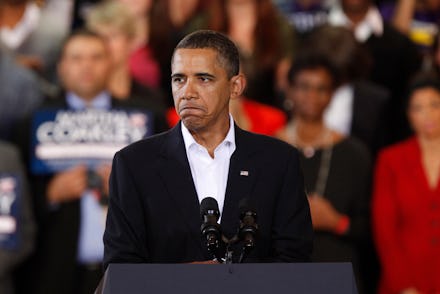Did Obama Just Ruin the Chance to Make McConnell a 5-Term Senator?

President Obama will likely continue to see political opposition to his historic plan forcing power plants to cut their emissions by 30%.
That's because the plan itself has provided invaluable fuel to the campaign of one of the biggest climate-change deniers in Congress: Senate Minority Leader Mitch McConnell (R-Ky.), who is fighting a close re-election campaign.
Obama's plan would seek to curb CO2 pollution, and would overwhelmingly target coal power plants. That, of course, isn't sitting well in coal country. Hours after Obama's big announcement, McConnell used the moment to build support in the coal community — which holds significant weight in his home state — and posted this viral image on his Facebook page:
It's clear the battle lines have now been drawn. Not only is McConnell using the Obama plan to amass support behind his campaign, he is also reaffirming that he will continue to be one of the biggest obstacles in the push to enact the broad climate change goals Obama is looking for.
The takeaway: Even if the alarm about climate change is at an all-time high, there will still be powerful politicians who completely oppose it. And those politicians will remain in power, because they're simply pandering to the interests of voters in their states or districts.
This is even in the face of 99% scientific consensus that climate change is real ...
... and it's threatening even our biggest cities ...
... and it's causing devastating droughts and forest fires ...
... and it's doing this to the country ...
And, in November 2014, here's what will happen: This man will be one of the most powerful people leading the Senate.
That's what McConnell told the editorial board of the Cincinnati Enquirer. He doesn't believe in global warming.
All this because Obama decided to fight coal, which happens to be propelling McConnell.
The dynamics of coal policy are complex. Coal is a major polluter — the energy produced an estimated 74% of total CO2 emissions in the U.S. in 2012, compared to other forms of electricity generation like natural gas and petroleum. Coal isn't a major job sector in the broad U.S. economy. Permanent blue-collar coal industry employees represent 0.12% of the U.S. workforce. But coal has created a base from which other industries thrive. Kentucky derives nearly all its electricity from the fuel. Coal supplies half of the electricity consumed by Americans. Cracking down on coal may very well cause a ripple effect throughout the economy; without this economic base, there won't be an immediate energy source available to meet demand.
"The economic impact of coal is much wider than just the mining," said Dr. Stephen Voss, a professor at the University of Kentucky. "A large manufacturing sector has sprung up in the state built around inexpensive energy, and regulations that undercut that cheap power source also impact the manufacturing base."
The climate business battle is something that even sways Democrats. Don't think that McConnell's Dem. challenger — Alison Lundergan Grimes — is hailing the Obama Doctrine on climate change.
"Alison is absolutely livid about the new rule and plans to use the event to share the stories of how Kentuckians are hurting and demand that the Senate take action to invest in clean coal technology," said Grimes spokeswoman Charly Norton in a statement.
On Monday, as Obama announced the regulations, Grimes pledged to "fiercely oppose the president's attack on Kentucky's coal industry because protecting our jobs will be my No. 1 priority."
Reducing greenhouse gases could have consequences for local employment. E&E News reports, "Under one EPA-proposed option for reducing greenhouse gases, there would be a loss of more than 14,000 mining jobs between 2017 and 2020." But it's not necessarily the jobs: the coal industry is in trouble because of issues far bigger than new government regulation as highlighted by the New York Times. Low-cost natural gas is an increasingly popular option and technology has made mining less reliant on human beings.
According to Faces of Coal, "Kentucky is the third largest coal-producing state in the country, producing 119.8 million tons of coal in 2008 alone." Experts say Obama's new coal plan could close hundreds of plants. This could have a severe impact on the state's agricultural-manufacturing-service economy, which is forecast to grow more slowly than the national economy in 2014.
"Until now, McConnell's rhetoric about the War on Coal was abstract," Voss added. This new regulation turns it into a concrete issue, gives his attacks a specific focal point."
There is historical precedent on McConnell's side. As Bloomberg notes:
"In 2010, Democrats lost 63 seats and their U.S. House majority in part because the White House pressed for passage of a carbon-reduction plan that infuriated the coal industry and its powerful energy sector allies. The legislation died in the Senate, where the party managed to maintain control despite equally virulent opposition to the Affordable Care Act."
There's nothing simple about climate change policy. While the dangers of climate change are now accepted by scientists, governments and businesses, a green future away from polluting fuels is not as easy as flipping a switch. While politicians like McConnell may be on the wrong side of science, there is much to fight for, and these politicians are, in fact, moving to defend their states' at-risk interests.
Maybe that's why Obama chose to bypass Congress with his latest EPA regulations.
Editor's Note: This story has been updated to remove language that was used without attribution to E&E News, the New York Times, and Faces of Coal. We apologize to our readers for this violation of our basic editorial standards. Mic has put in place new mechanisms, including plagiarism detection software, to ensure that this does not happen in the future.